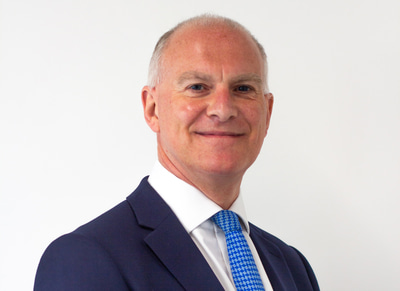- OT
- Professional support
- Health services
- Q&A: Andrew Robertson
Q&A: Andrew Robertson
OT talks with the director of private care at Moorfields Eye Hospital

16 June 2022
Profits from Moorfields Private are reinvested back into Moorfields Eye Hospital NHS Foundation Trust for the benefit of all patients.
OT spoke with director of private care, Andrew Robertson, to learn more about the private ophthalmology provider.
Can you tell me about Moorfields Private and its points of difference to other private ophthalmology providers?

I have managed a number of private hospitals in my time. The investment at Moorfields in equipment and technology is far greater than anywhere I have been. That is all supported by the research that we do in partnership with University College London. We are at the forefront of developments in ophthalmology. We are able to offer education to groups, including optometrists, that supports the work that is being done.
How has Moorfields Private adapted following the pandemic?
During COVID-19, we have had to adapt and implement infection control measures. We set up telemedicine services to enable patients to continue having consultations. I think we will continue telemedicine going forward. It helps people who are coming from abroad – rather than just getting on a plane, they can have that initial interaction with a consultant first.We redeployed staff during the pandemic. When we were only doing emergency, sight-saving surgery, and elective surgery was on hold, we redeployed a number of staff to other hospitals to help with the COVID-19 response in London. We had a major cataract drive during the pandemic, treating around 800 cataract patients in a week.
What we are seeing as a result of the waiting lists is people paying for their own private treatment. Ophthalmology is much more affordable to a greater number of people than say, having your hip replaced, which could cost £12,000. The other area we are seeing a specific growth in is laser eye surgery. Partly, I am told, this is being prompted by people becoming frustrated with glasses fogging while wearing masks.
How does Moorfields Private plan to develop in the future?
We are focusing on partnering with optometrists. It is so important that we work together for the whole patient pathway. For most people, their journey starts with the optometrist. It is a relationship that goes both ways. We are listening to optometrists about what they would like from us – whether that is education or communicating the range of expertise that we have within Moorfields. Whatever question an optometrist might have about a patient, they can turn to us and we can give them an answer.We are developing a central London facility at New Cavendish Street with more consulting rooms, theatre and a laser eye surgery suite. That will offer an option for patients to either attend there or come to City Road where the main hospital is.
This is about patients being at the centre – if you get that right, then everything else follows
We are starting shared care for cataract surgery. That is a really good example of how optometrists become part of the care for those patients. It is not just a matter of referring the patient to Moorfields and then having the patient transferred back later down the line. It is bringing the optometrist into the treatment pathway.
In hospitals you spend a lot of time engaging with GPs. For ophthalmology, optometrists are consistently the primary point of care. That is where it starts. It is so important that we partner with optometrists and build relationships with them.
How does Moorfields private complement the work of the NHS?
All of the profits from Moorfields Private go back into the NHS – to help treat NHS patients, to assist education and fund research. It is really important that we generate a good contribution that we can then put back into the trust.I think there will always be a place for private care. People want choice. The other thing is that the international patients, who may not qualify for NHS treatment, can also come to Moorfields and benefit from expertise that we can offer through the private route. In terms of investment in Moorfields Eye Hospital, it really is important that we maintain a private offering.
What do you find rewarding about your role and what motivates you in the work you do?
People have confidence and reassurance in the name, the brand and the expertise that is here.
We know that we have the complete ophthalmology offering as a private provider. In a business that deals with sight, which is really important for all of us, to know that I am part of that is personally satisfying.
A reoccurring theme with patients is that they will say ‘I wish I had done it sooner.’
Whether it is cataract surgery or laser eye surgery, it suddenly changes their life. That illustrates what a difference it makes to people. This is about patients being at the centre – if you get that right, then everything else follows.
To find out more about our services, you can contact Hayley Raison, our Primary Care Relationship Manager, on 07590 494 806 or at [email protected]
Advertisement


Comments (0)
You must be logged in to join the discussion. Log in